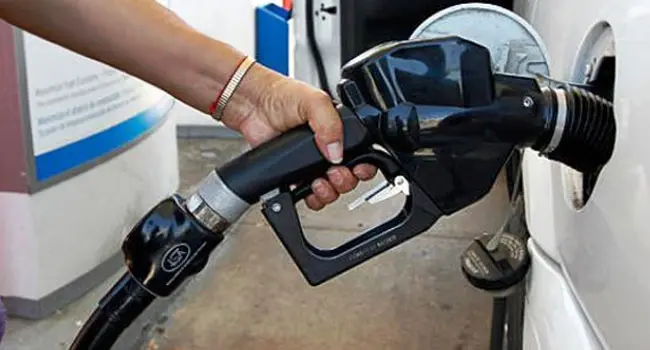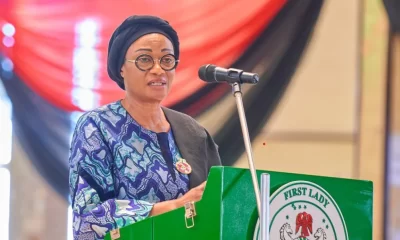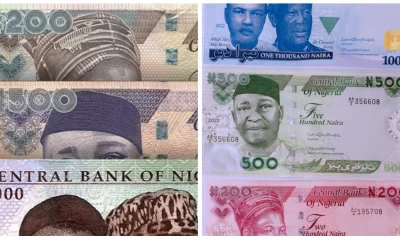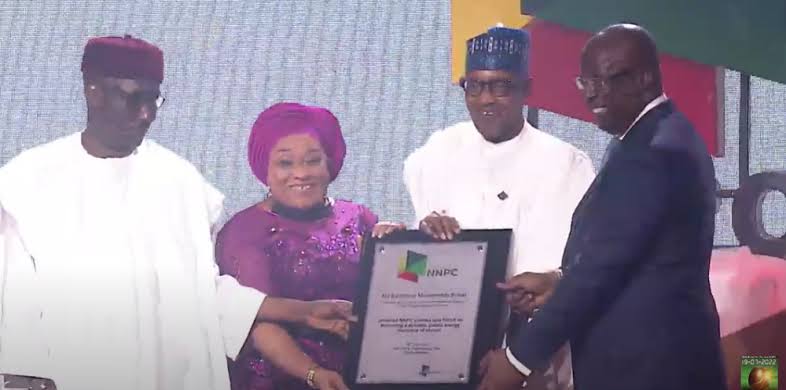Business
Again, fuel subsidy debacle and Nigeria’s future
Published
3 years agoon
By
Publisher
By Marcel Okeke
As an Albatross that it is, the controversial issue of removal or non-removal of fuel subsidy has once again come to the front burner of public discourse, heating up the Nigerian polity. As the nation inches to the date of the President Muhammadu Buhari administration to hand over to the next on 29 May 2023, the subsidy conundrum resonates. Incidentally, all the presidential candidates during the 25 February 2023 elections had fuel subsidy removal at the core of their economic manifestoes—including the President-Elect/Candidate of the All Progressives Congress (APC). But as the D-Day is approaching, the Organised Labour (Nigeria Labour Congress and Trade Union Congress) and other stakeholders are literally up in arms, denouncing and deprecating the imminent fuel subsidy removal.
Related: Nigeria economy faces fiscal risk over CBN policies
Specifically, the leading labour body—NLC—has warned that “subsidy removal will set Nigeria on fire,” saying that those pushing for it in Nigeria now should forget the idea “and save the country from another round of social unrest.” NLC Secretary General, Emmanuel Ugboaja said in Lagos on Tuesday, 4 April 2023, that “nobody should drag the masses and Nigerian workers into any increase in fuel price in the name of subsidy removal, as the organised labour would kick against it.” The Muhammadu Buhari administration had however in the 2023 Appropriation Act made provision for fuel subsidy (funding) up until its exit date, practically leaving the ‘can’ for the incoming Government.
But the NLC scribe argues that it will be uncharitable in 2023 for any government to be talking about subsidy or no subsidy “for a product that is naturally and thoroughly well-endowed in Nigeria.” His words: “if in 2023, rather than getting people that will make proper use of our natural endowment, we are busy discussing the cosmetic issue of subsidy or no subsidy, then it is absurd.” Ugboaja said what “we should be discussing is how to refine crude oil in Nigeria and make the product available for domestic consumption; anything outside that shows the wickedness of the kind of elite we have…”
Related: Renowned economist Marcel Okeke joins National Daily as Columnist
On the same vexed issue—fuel subsidy—a group (The Northern Youth Council of Nigeria)—has also warned the Federal government to stop the planned fuel subsidy removal, threatening that “such a move would be resisted. Stressing the potential impact of subsidy removal on the “already struggling economy and Nigerian people,” President of the Council, Isa Abubakar said in Kaduna on Wednesday, 5 April 2023, that “any palliative measures put in place to cushion the effect of the subsidy removal would be looted by corrupt persons, just like the COVID-19 intervention funds.” The Group therefore called on the Government to “reconsider its decision to remove the subsidy, arguing that it would only lead to an increase in the cost of living for the average Nigerian, who is already struggling to make ends meet.”
Incidentally, in anticipation of the social catastrophe the fuel subsidy removal could unleash on the Nigerian polity, the World Bank has made a grant of US$800 million to the country “to scale up its national social programme.” Giving details on this, Minister of Finance, Budget and National Planning Ms Zainab Ahmed said in Abuja that Government was considering cash transfers and mass transit buses for workers “to ease the pain of the subsidy removal on most vulnerable segment of its population.” It should be noted that Nigeria in its 2023 budget had set aside a whopping sum of N3.36 trillion to spend on fuel subsidy up until the middle of the year. But expatiating the proposed ‘social welfare’ scheme to cushion the ‘pains’ of subsidy removal, Ms Ahmed said the country “has registered ten million households, which is equivalent of 50 million people on its vulnerable list.”
The Minister further said “several things are still on plan,” adding “some we can start executing quickly while some are of long-term consideration.” Still on the feared socio-economic effect the subsidy removal could have on the populace, Labour Minister, Dr Chris Ngige recently recommended that the next administration must consider “giving public sector workers pay rises after removing fuel subsidy in June.” Similarly, the World Bank had in 2021 said it expected the COVID-19 crisis to push over eleven million Nigerians into poverty by 2022—“taking the total number of people classified as poor in the country to over 100 million.”
All these unarguably show that the fuel subsidy issue is yet a ‘time bomb’ which, if not adroitly handled could explode and trigger unintended social upheavals across the country. The Muhammadu Buhari administration had over the years showed lack of political will to effectively deal with the fuel subsidy conundrum. Even the law of the land that stipulated the ending of fuel subsidy by mid-2022, had to be ‘suspended’ in the heat of the brouhaha and social tensions generated by the import of the enactment. A section of the much-awaited Petroleum Industry Act (PIA) had provided for the ending of the controversial fuel subsidy regime by mid-2022. However, apparently intimidated by the socio-political implications of ‘unilaterally’ ending the subsidy regime, the Federal Government buckled and backpedalled on the matter.
Obviously bereft of the political will to push through the fuel subsidy removal, the Federal Government claimed it was ‘going back’ to the National Assembly to propose an amendment of the PIA to make for some “18 months extension…for the implementation of the fuel subsidy removal”. PIA which made provision for deregulation of the oil and gas industry was to come into force in February 2022. And so, against the law and its will and fiscal plan, the Federal Government keeps dragging along the ‘fuel subsidy albatross’—till the end of the current Administration in May 2023. And without a doubt, over the years, fuel subsidy administration has remained opaque and indeed, a cesspool and drainpipe to scarce public funds—to the anger of the populace.
While huge public funds (N3.36 trillion for first five months in 2023 budgeted) have been literally going down the drain over the years, fuel subsidy still remains shrouded in controversy. Up until today, the existence and form of the subsidy regime is being questioned by not a few groups and stakeholders. Yet, the subsidy incubus is a creation of the system—the wilful and persistence of mismanagement of Nigeria’s oil refineries for decades—leading to their perennial shutdown. The refineries, while they lasted, had guzzled billions of Dollars in the name of “upkeep”, and yet, could not produce any refined oil for domestic consumption. The refineries have a combined 445,000bpsd capacity. Port Harcourt refinery complex (old and new site) has 210,000bpsd, Warri has 125,000bpsd and Kaduna has 110,000bpsd capacity.
The collective failure of these refineries has forced the oil-rich Nigeria (the biggest oil producer/exporter in Africa), a key member of the Organization of Petroleum Exporting Countries (OPEC) to depend completely on imported refined petroleum products. Consequently but unfortunately, almost all crude oil export proceeds are being used to import the refined oil for domestic use. And this has been obstructing the channelling of funds to many other critical social and economic needs for meaningful development. Ironically, as the prices of crude oil rise in the international market, the cost of refined products (being imported by Nigeria) correspondingly goes up. And the Government, in order not to further increase the penury and suffering of the citizenry, ‘absorbs’ part of the ‘landing cost’ of the imported refined products, before they are sold to the public. This ‘absorbed’ cost is the ever-present subsidy.
For over a year (February 2022 to date), most oil producers and exporters around the world have been experiencing windfall arising from soaring oil prices (mainly as part of the effects of the Russia-Ukraine war). Unfortunately, Nigeria has been going through ‘gloom and doom’—battling with unfavourable fiscal profile—borrowing endlessly from all parts of the globe, even in the twilight of the current administration. Indeed, according data from the Nigerian National Petroleum Company Limited (NNPCL), by the end of the 2022 fiscal year, the Federal Government had spent a whopping N12.05 trillion since 2015 on refineries’ repairs and fuel subsidies.
So, as the clock is ticking, taking Nigeria to May 29, 2023, will the new administration have the liver, guts and political will to ‘kill’ fuel subsidy? What it does with the extant despicable subsidy regime will serve as a veritable ‘acid test’ for the future of the country under the New Government. The world surely is watching!
- Mr. Okeke, an economist, sustainability expert and consultant on business strategy, and is a National Daily Columnist. He can be reached at: [email protected]
You may like
Trending

 Entertainment6 days ago
Entertainment6 days agoSinger Simi faces backlash after TikToker admits to false rape allegation

 Entertainment3 days ago
Entertainment3 days agoSimi addresses resurfaced 2012 tweets amid online backlash

 Comments and Issues6 days ago
Comments and Issues6 days agoNigeria’s Declining Oil Output and Soaring Foreign Portfolio Investment Inflow

 Business7 days ago
Business7 days agoPENGASSAN warns Tinubu’s executive order on oil revenues could jeopardise 4,000 jobs

 Comments and Issues6 days ago
Comments and Issues6 days agoEx-prince Andrew’s arrest, lessons for Nigeria

 Health1 week ago
Health1 week agoNanoplastics may disrupt brain cells that control puberty, fertility, study finds

 Editorial Opinion1 week ago
Editorial Opinion1 week agoFirst Lady, Senator Oluremi Tinubu: A call to purpose beyond symbolism

 Comments and Issues6 days ago
Comments and Issues6 days agoThe Seyi Tinubu’s jellof rice, loaves of bread




